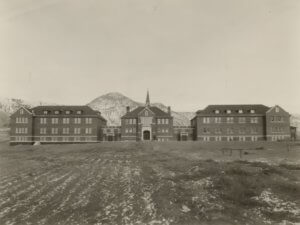This year parents had a difficult decision: send their kids to school or keep them home?
While a first for most parents, it’s nothing new for those with immunocompromised children. Cleaning protocols and social isolation are familiar realities for these families.
But social isolation comes with challenges as well.
In Saskatoon, a group of parents with immunocompromised kids created a third option. They decided to find a way to provide a safe in-person learning environment for their kids and formed the At-Risk Together (ART) Co-op — a co-operative school.
Nothing new about the new normal
For ART Co-op founding member Krysta Shacklock and her family, 2020 wasn’t an “unprecedented” year.
In fact, during the pandemic, their day-to-day hasn’t changed much at all — they’ve been limiting their contact with others for a while. They had cleaning protocols long before COVID-19 was a daily headline and were already concerned about the risks of sending their daughter to school.
Two years ago, Krysta’s now five-year-old daughter was diagnosed with lymphoma. And like other families with at-risk members, the Shacklocks were taking precautions long before the pandemic began.
When the common cold can mean a five-day minimum stay in the hospital, school can be a hazard. Krysta enrolled her daughter in a private school with smaller class sizes as a precaution. Still, this fall, she kept her daughter home.
But Krysta realized not everyone has this option. Some can’t afford to have one bread-winner stay home or pay for someone to watch their kids. The disparity didn’t sit right with her. She thought all parents deserve peace-of-mind, and their children should get a quality school experience.
After talking to other parents in similar situations, Krysta met Kath Stevenson, who’s at-risk son attends the same school as her daughter. Both wanted to help other families by providing a safe option for those who want one. So the two took to Facebook to rally the immune compromised community, and ultimately created a petition that was sent to the Minister of Education for funding for safer school options.
Though the petition garnered more than 1400 signatures, they didn’t receive much of a response. Finding no help from the provincial government, and no other options available, Krysta and Kath knew they had to act.
“Kids are going to keep getting diagnosed with immune deficiencies, and there has to be a better option,” she said. “It’s like the whole world gets to see what our reality is like, and it feels like the right time to jump in and build something for these kids and their families — to build a community where these families can try to have some normalcy.”
So after hosting a virtual town hall, wherein a number of community members from various backgrounds assembled, the idea for the Art Co-op was born.
A deceptively simple idea
The ART Co-op’s mission is deceptively simple: to provide a safe, in-person school option for at-risk students (or students with at-risk family members), and for it to be entirely free.
The co-operative school will provide programming for students in Pre-K to Grade 8, taught by teachers who are also immunocompromised. The school will take precautions that other schools don’t: students grouped in cohorts of peers with similar risk levels and more stringent cleaning protocols. And, as a co-op, it will be governed by parents, who are well-placed to make the best decisions about their children’s well-being.
Of course, setting up a school takes time. It takes two years to qualify for funding as an independent school in Saskatchewan. In the meantime, the group plans to start by offering daycare services and preschool.
A co-operative school is a risk worth taking
Krysta said the in-person school experience is crucial for children to develop social skills, which is one of the co-op’s top priorities. Hours of isolated, online learning isn’t what developing minds need. It’s interactions with other kids.
“I can teach my kids math and their letters, but I can’t teach them how to share unsupervised, or deal with conflict, or trust in others,” she said. “They need friends. It’s so important.”
Not only does socializing provide children with life skills, but it also allows at-risk kids to get a sense of normalcy.
“In the cancer centre, kids would be hooked up to their IV’s, and they would be colouring together, talking, playing. It normalizes the whole process and makes it easier to deal with — for the kids and for the parents,” Krysta said. “Seeing that they aren’t the only one with their diagnoses is really helpful and helps minimize some of the trauma that comes with getting an extreme diagnosis.”
Because the co-operative school wants to provide its service for free, and the co-op won’t qualify for funding from the Saskatchewan government for two years, one of the first steps is to fundraise. So the group is looking to corporations and co-op membership sales for the start-up capital.
“We want it to be completely funded — we don’t want people to wonder if they can afford it,” Krysta said. “We want people to feel safe, we want people to see this as an option available to them when they get a diagnosis for one of their family members”.
The reward of the risk
The co-op has a lot of learning and planning to do. But Krysta is excited about the amount of interest community members and professionals alike have shown in the school.
Though Krysta was first inspired to start the co-operative school after her daughter’s diagnosis, it’s unlikely she’ll benefit from the school herself. Her daughter completes treatment later next year.
But she still wants to make a change for other families.
“There needs to be a way to build a community in this era of isolation — and developing it for the kids and for the parents is my way to give back,” she said. “That’s where my drive comes from. Chances are when this school is up and running, my children won’t need it. I want there to be a space like this for other kids and families who do”.
And though this “era of isolation” will eventually run its course, those with at-risk members will continue to need safe schooling opportunities. Krysta believes the ART Co-op will make a difference for both children and parents.
“When my daughter was diagnosed with cancer, I saw the incredible community surrounding those kids — those warriors — I wanted to find a way to give back,” she said. “Unless you’ve walked it, you don’t realize how hard the journey is. I want to make it easier for families who will have to go from this from the start or have to do it again.”

 Written by
Written by 



